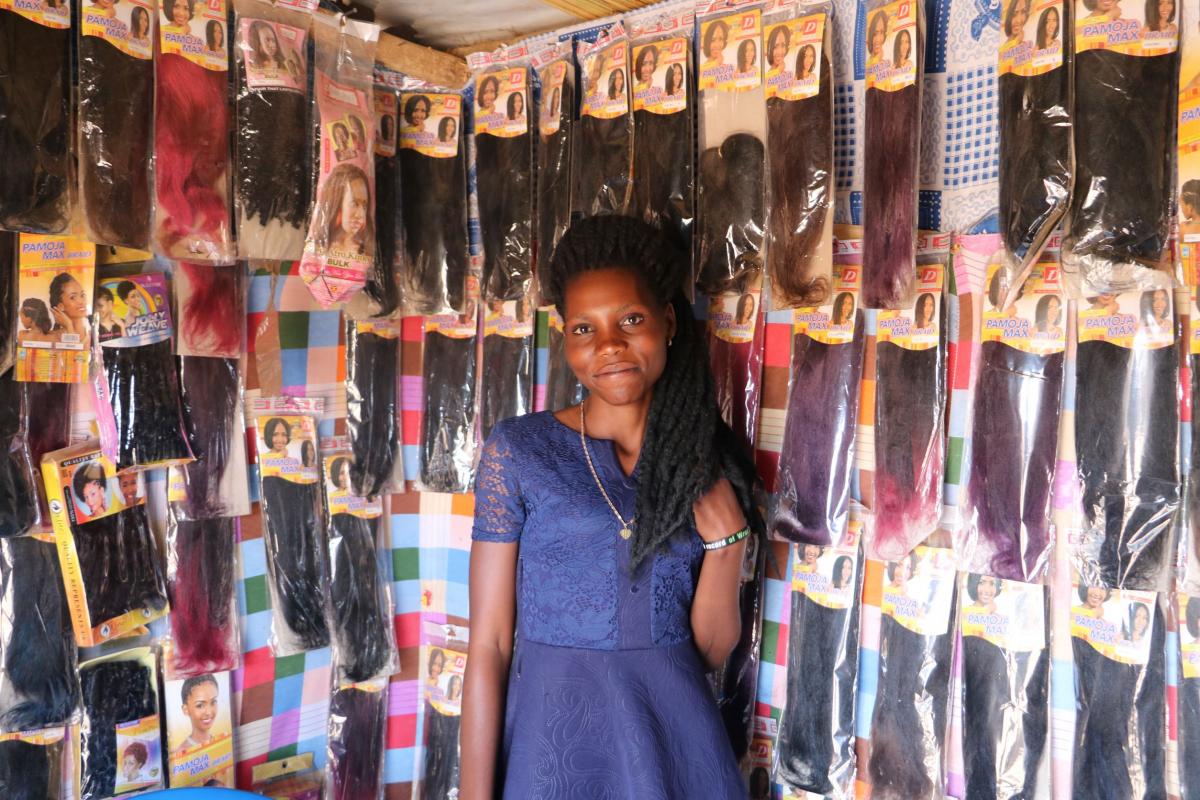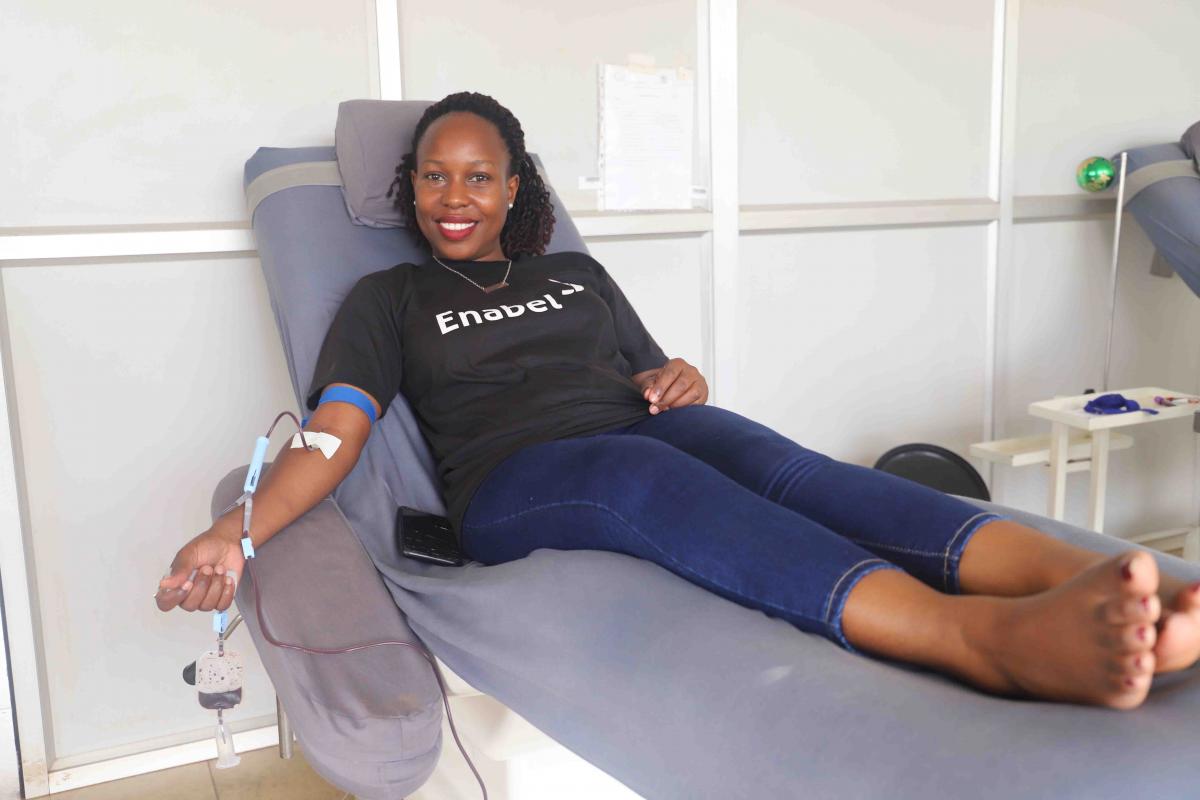Search
Viewing 1575 to 1590 of 3123 news
-
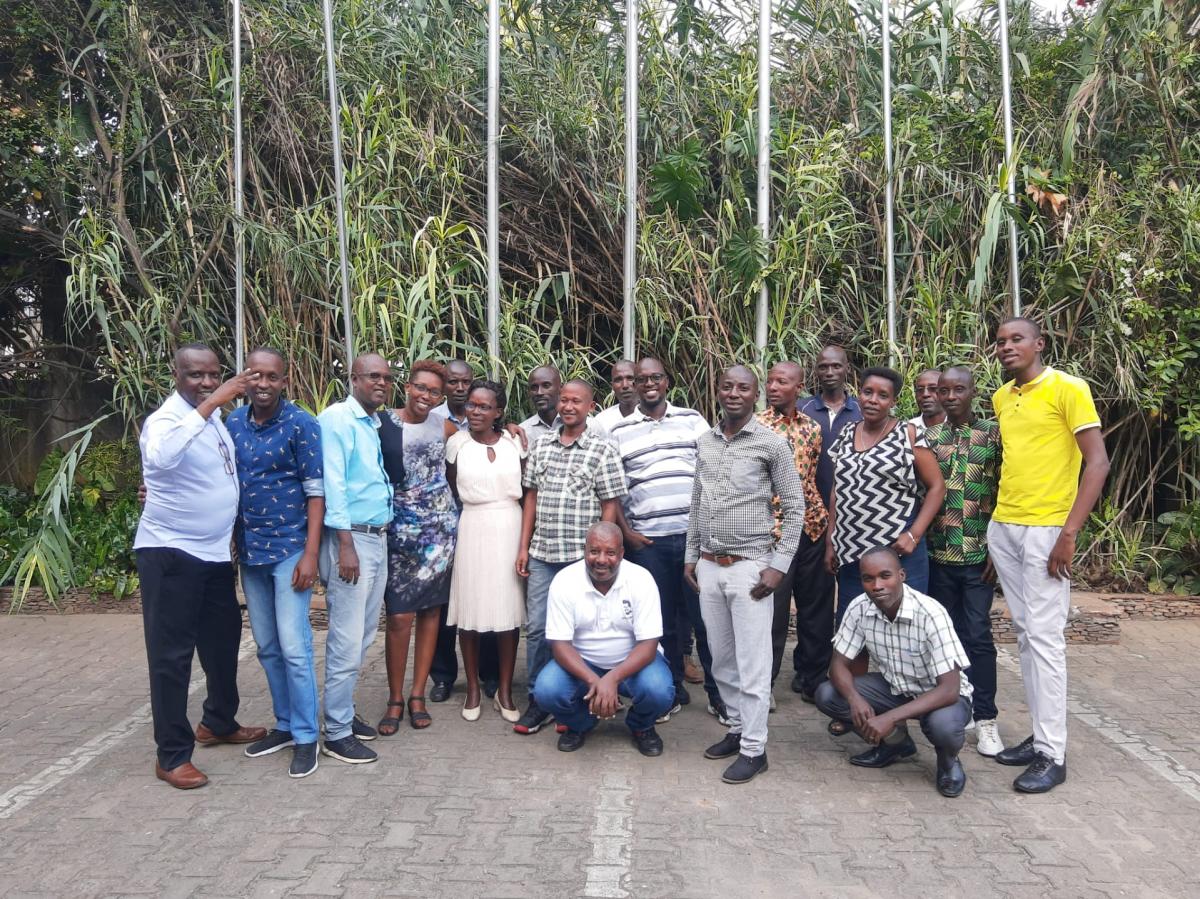
Burundi: Formation à l’exploitation de bibliothèques numériques dans 8 Centres d’Enseignement de Métiers
Philippine DE BRUYN | 17/06/2022
L’un des objectifs du projet RESICODI (Resilience to Covid through Digitalisation) est d’améliorer et implémenter des solutions numériques pour favoriser la qualité et la continuité de l'enseignement et des services éducatifs en réponse à la crise sanitaire. En partenariat avec les directions et formateur•trices des centres, les équipes du projet, à la suite de la pose d’un diagnostic des besoins, ont entrepris l’implémentation d’une solution permettant un meilleur accès aux ressources numériques et ceci, même sans accès à une connexion internet stable. Pour ce faire, Enabel et Bibliothèques sans Frontières collaborent afin de mettre en place des « Ideas Cubes », des bibliothèques numériques et autonomes, qui fonctionnent sans connexion internet pour fournir un accès à l’information dans les endroits les plus reculés. Dans ces bibliothèques numériques, les utilisateur·rices ont accès à pas moins de 60 capsules vidéo tournées pas une équipe de jeunes vidéastes de Bujumbura en Kirundi (et sous-titrées en français) et développées expressément dans le cadre du projet-sœur ACFPT (Appui Complémentaire à la Formation Professionnelle et Technique). L’objectif de la collaboration est de mettre à disposition dans des centres d’enseignement de métiers ces bibliothèques numériques mais aussi une implémentation de long terme permettant aux formateur•trices de s’approprier le matériel et l’utiliser avec leurs élèves. C’est dans cette dynamique que s’inscrivent les formations données aux équipes enseignantes ayant eu lieu récemment dans 8 Centres d’Enseignement des Métiers. Ces formations, organisées en collaboration avec les centres partenaires, permettent aux apprenant•es d’échanger sur la pertinence de l’outil, sa prise en main mais aussi les besoins spécifiques rencontrés sur le terrain. Au total, ce sont 43 de formateur•trices ayant suivi 3 jours de formation. « J’ai beaucoup apprécié le dynamisme du groupe de formateurs et directeurs techniques. » - Arthémon Bayisabe, formateur IDC de Bibliothèques Sans Frontières « Nous tenons à remercier Enabel et Bibliothèques Sans Frontières pour la bonne collaboration et le suivi. Nous ferons de notre mieux pour mettre en application ce que nous avons appris et de le transmettre à nos collègues. » - Hamenyimana Yvonne, CEM/CFP Don Bosco Buterere À propos de RESICODI Une partie de la réponse d'urgence de l'Union Européenne au COVID-19 est l'action "Résilience au COVID-19 par la digitalisation" (RESICODI). Cette action est co-financée par l'Union européenne et le Ministère Fédéral Allemand de la Coopération Economique et du Développement (BMZ) et est mise en œuvre conjointement par Enabel et GIZ.
-
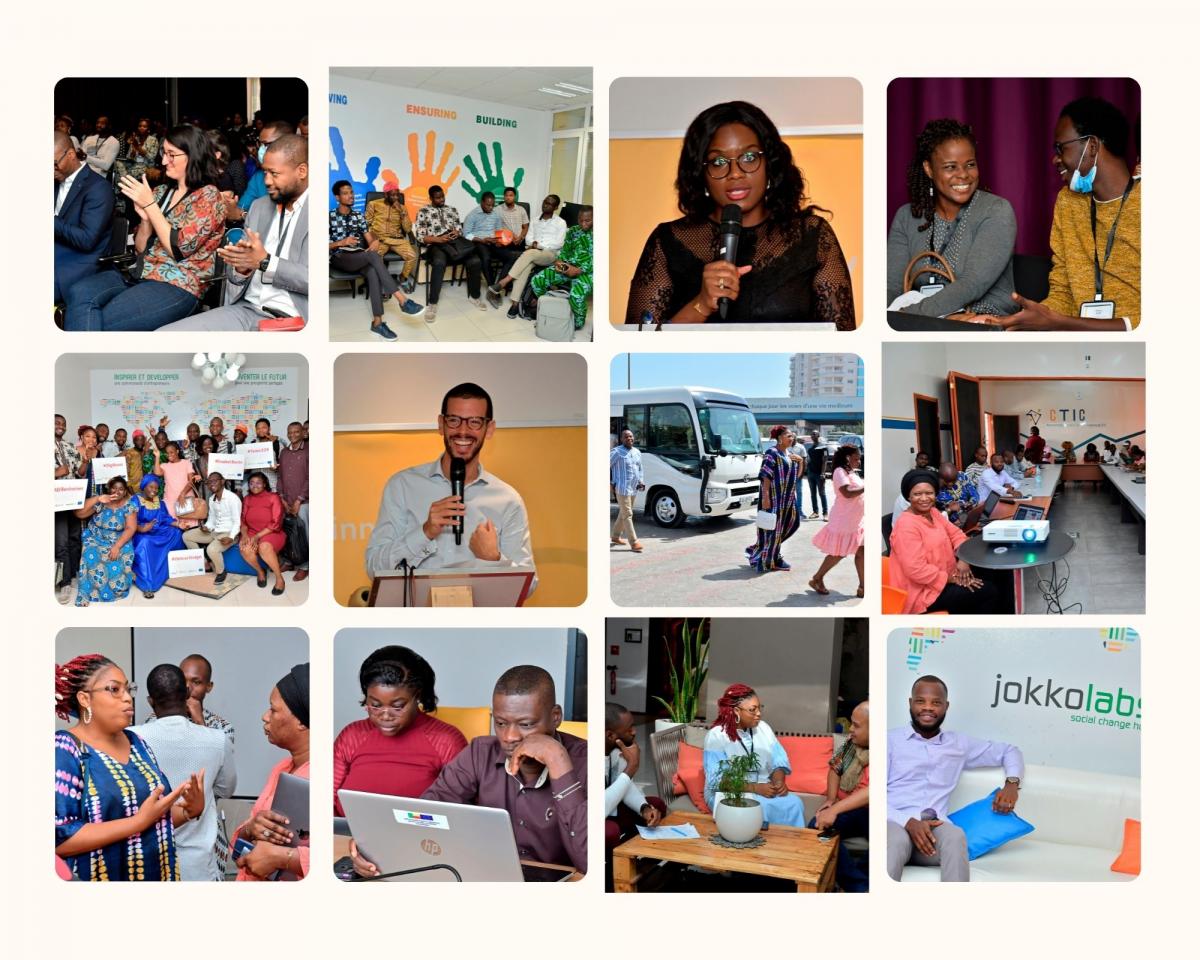
Digiboost Study Tour Dakar : 18 Structures d’Appui à l’Entrepreneuriat Innovant du Bénin en immersion au Sénégal!
Reece-hermine ADANWENON | 16/06/2022
Dans le cadre d’une mission d’apprentissage organisée par le projet DigiBoost financé par l’Union européenne et exécuté par Enabel au Bénin, plus d’une vingtaine de Responsables des SAEI béninois ont séjourné au Sénégal du 5 au 12 juin 2022. Cette délégation de 24 personnes constituées de 18 Structures d’Appui à l’Entrepreneuriat Innovant (SAEI), de partenaires et acteurs clés du projet Digiboost a eu l’opportunité de découvrir les innovations majeures de l’écosystème numérique sénégalais et de prendre part à l’événement « l’Afrique Innove » organisé par Afric’innov. Les deux premières journées de travail ont permis à la délégation des SAEI Béninoises d’apprendre les bonnes pratiques de l’écosystème entrepreneurial sénégalais à travers la visite de nombreuses structures comme : la DER-le Consortium Jeunesse Sénégal-Orange Digital Center- CONCREE- la CTIC Dakar- Women’s Investment Club (WIC) Capital- Jokkolabs Dakar- l’USAID Entrepreneuriat & Investissement. Pour le compte de la troisième et quatrième journée de travail, la délégation des SAEI béninoises a participé à l’évènement « l’Afrique Innove » organisé par Afric’innov les 09 et 10 juin 2022 au Novotel de Dakar, et qui a rassemblé les acteurs de l’écosystème entrepreneurial Africain. La journée du 09 juin fut marquée par des panels et des ateliers de formation à l’endroit des dirigeants des SAEI présents. Les différentes thématiques abordées ont permis aux différentes délégations de prendre connaissance des outils existants pouvant améliorer la gestion des équipes et des finances de leur SAEI. Cette première journée à l’événement « l’Afrique Innove » a donc permis à chacun des membres de la délégation des SAEI béninoises de renforcer ses compétences managériales afin de redéfinir au mieux les objectifs stratégiques de sa structure pour une meilleure planification de ses activités. La journée du 10 juin fut une journée d’échanges, riche en thématique et de partage d’expériences qui a permis aux participants de mieux appréhender le rôle des SAEI dans le développement des industries culturelles et créatives en Afrique. Cette deuxième journée a ainsi permis à chacun des membres de la délégation des SAEI béninoises de découvrir une autre dimension des écosystèmes et toutes les opportunités qui vont avec. Pour le compte de la dernière journée de travail, la délégation des SAEI béninoises a visité deux autres acteurs de l’écosystème sénégalais que sont : Incubateur ISM Incub & IESA Incub-Impact Hub Dakar. Ce fut un moment de partage d’expérience qui a permis à la délégation béninoise d’apprendre de ces structures qui interviennent en tant qu’accélérateurs de projets innovants et d’entrepreneuriat culturel.
-
Uganda: Gaba earning big from hairdressing
Catherine BEKUNDA | 15/06/2022
Sarah Gaba is a 26-year-old South Sudanese refugee currently living in Bidi Bidi refugee settlement. She dropped out of school at senior two due to the war that broke out in her country. She hopes to go back home one day when peace is restored. Gaba came to Uganda on 16th October 2016 with her mother and a little son. Hers is a story of hope and hard work. She was trained in hairdressing in 2019, a trade that has seen the young mother save Sh.11,000 on a weekly basis in her Village Saving Group. This has enabled Gaba to take care of her family. “I think I have about Sh.200,000 on my account,” she says with a smile. Gaba earns an average of Sh. 250,000 from plaiting hair and Sh.400,000 from selling braids monthly. To expand her business, she got a loan of Sh.300,000 from her savings group to construct a small saloon. “The loan is very expensive because it attracts an interest of 10% per month,” Gaba explains. Her main challenge is the lack of electricity which is a necessity for some hairstyles. She however improvises by requesting customers to sit under the sun to dry their hair. “If I can be helped to get solar power, it would increase my sales and output. Solar is good because it’s a one off cost,” she reasons. Gaba also lacks a signpost for her business. She relies on her good works as a marketing tool. A signpost would cost Sh.100,000 which for now she finds expensive. Having participated in a supplementary training on business management, Gaba has improved her customer relations and better negotiates with suppliers. Unlike previously, she also now keeps records to know whether the businesses is making profits or losses. “The training was helpful because I previously used to disappoint my customers, I have learned to inform and convince them now. When I am fully booked, they now wait,” Gaba shares. In the hope of making life better for others, Gaba has shared her skills with three other girls who have gone ahead to start their own saloons. She is currently training another set of three. Although her formal education was cut short by the pangs of war, Gaba has big dreams for her son. “My dream is to take my son to a boarding school in Koboko or Arua district,” she says. Although she earns some income from the saloon business, Gaba hopes to double her monthly earnings from the current Sh.400,000. More income, she says, will enable her to meet all expenses including school fees and medical care for the family. Gaba was trained by Enabel through the Norwegian Refugee Council under the Support to Skilling Uganda (SSU) project financed by the European Union Emergency Trust Fund. The project focuses on increasing access to quality skills development through offering training scholarships, entrepreneurship skills and start-up kits for refugees and host communities.
-
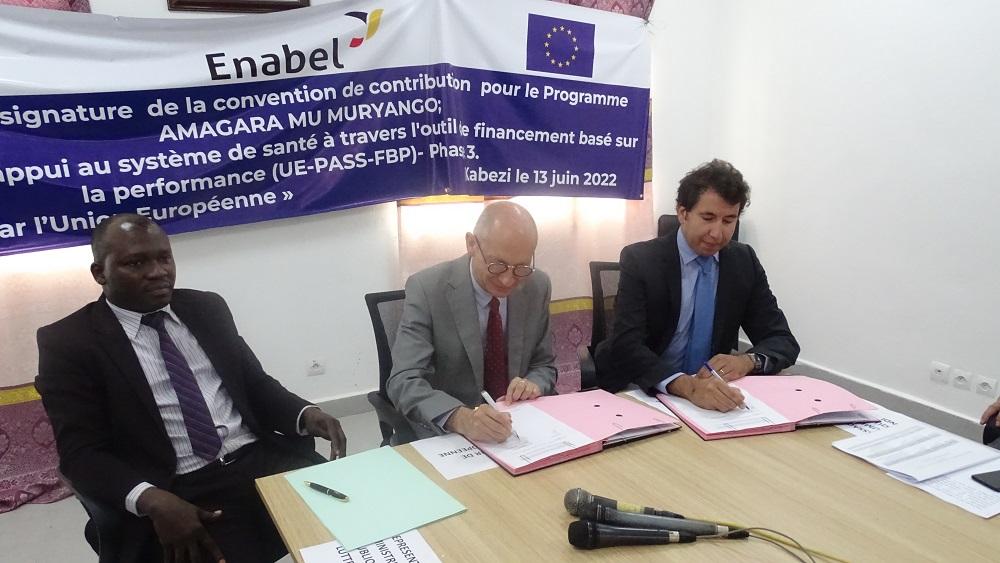
Burundi: Lancement de la 3ème phase du Programme « AMAGARA MU MURYANGO »
Jean BIRONKWA | 15/06/2022
L’Ambassadeur de la délégation de l’Union Européenne au Burundi, Mr Claude Bochu, et le Représentant Résident d’Enabel, Mr FASSI-FIHRI Abou, ont signé une convention de contribution pour la mise en œuvre de la phase 3 du Programme « AMAGARA MU MURYANGO » le 13 juin 2022 dans les enceintes du District Sanitaire de Kabezi en Province de Bujumbura.La cérémonie s’est déroulée en présence de l’Assistant du Ministre de la Santé Publique et de la Lutte contre le Sida, le Dr Nzigirabarya Onesphore. L’Ambassadeur Claude Bochu a signalé que cette phase est financée par l’Union européenne à hauteur de 48,5 Millions d’euros et par le gouvernement belge à hauteur de 6,1 Millions d’euros. Au cours du mois de juillet, Enabel, va signer à son tour une convention de subsides avec le Ministère de la Santé Publique et de la lutte contre le Sida. Ces cérémonies ont été également honorées par la présence de l’Ambassadeur du Royaume de Belgique au Burundi, Mr Alain Van Gucht. La cérémonie de la signature de la convention a été précédée par une visite des différents services de l’Hôpital de Kabezi qui sont des produits de la coopération. Après cette visite, les invités de marque ont exprimé leur satisfaction suite aux résultats atteints lors de la mise en œuvre de la deuxième phase du Programme d’Appui au Système de santé à travers l’outil de financement basé sur la performance mais aussi leur engagement à appuyer le gouvernement dans l’amélioration de l’état de santé de la population burundaise. Dans son discours, l’Ambassadeur du Royaume de Belgique s’est réjoui d’avoir contribué à la politique du Gouvernement du Burundi à travers sa stratégie de financement basée sur les performances couplée à la gratuité des soins pour les femmes enceintes et les enfants de moins 5 ans. L’Ambassadeur Alain Van Gucht a signalé que l’actuelle nouvelle phase du Financement du Programme AMAGARA MU MURYANGO (PASS-FBP3) sera construite dans la continuité non seulement des projets PASS-FBP1 et PASS-FBP2 mais aussi en synergie avec les projets résilience de l’UE et les projets de la coopération bilatérale belge. Par cette occasion, l’Ambassadeur du Royaume de Belgique a apprécié ces synergies qui existent entre les projets financés dans le cadre du Team Europe et particulièrement entre l’UE et la Belgique. Quand l’Union Européenne finance principalement les aspects softs de la santé, la Belgique complète utilement avec les aspects Hard notamment les infrastructures, équipement et leur maintenance, les aspects innovants en rapport avec la digitalisation des processus métiers ou les aspects nouveaux de formation via des approches et techniques nouvelles comme la formation à distance, a-t-elle ajouté.L’Ambassadeur de la délégation de l’Union Européenne a signalé que l’une des priorités que l’Union européenne s’est fixée pour ses actions de coopération, en accord avec les autorités du Burundi, est l’amélioration de la santé des populations. Depuis 2014, un tiers des financements de l’Union destinés à ce pays (soit 122 M€ ou environ 250 milliards BIF) sont orientés vers le secteur de la santé, et ce secteur est confirmé comme prioritaire dans la nouvelle phase de programmation de la coopération de l’UE avec le Burundi pour la période 2021-2027. L’Union européenne restera un partenaire fiable et fortement engagé auprès des professionnels de santé de ce pays. Car, pour l’UE, comme pour d’autres, la santé est un droit et un bien global et nous continuerons à travailler ensemble avec les autorités de ce pays et nos partenaires afin que ce droit soit une réalité pour le plus grand nombre de burundais et de burundaises. L’Assistant de la Ministre de la Santé Publique et de la Lutte Contre le Sida a révélé que « cet appui a permis de faire évoluer pas mal d’indicateurs de la santé comme le nombre moyen de jours de rupture de stocks pour 17 médicaments traceurs qui est passé de 22,2 jours à 2,6 jours pour la période de juillet 2016 à avril 2022. Le taux d’accouchement assisté par un personnel qualifié est passé de 74% à 81% de 2016 à 2021 ». Quels résultats attendus pour la troisième phase du Programme #AMAGARAMUMURYANGO Le Programme d’Appui au système de Santé à travers l’Outil de financement AMAGARA MU MURYANGO, Phase 3 va toujours assurer le copaiement des factures de formations sanitaires pour 48 mois, à hauteur d’une moyenne de 800.000 € par mois soit plus d'1 milliard 720 millions de franc bu. Le deuxième résultat du Programme est l’appui à la vérification, la contre-vérification et validation des données du FBP-G à travers la mise à jour de la digitalisation de la vérification et la mise en place de registres uniques, l’appui aux évaluations à l’improviste, le maintien pendant 48 mois des audits financiers complets, l’appui aux contrôles internes. Le Programme va appuyer également le MSPLS pour les frais liés au fonctionnement du mécanisme FBP notamment la CT-FBP et le MSPLS bénéficieront d’un dispositif de mobilité avec 2 véhicules et chauffeurs ; Un appui à la qualité des soins sera également apporté par l’amélioration de la transfusion sanguine, la réalisation d’audits cliniques au niveau des hôpitaux de district (HD), démarrage du processus d’accréditation des hôpitaux au Burundi, la redynamisation de la gestion des médicaments et maintenance. Un appui à la numérisation et support à l’amélioration de la performance et le fonctionnement du SNIS à travers l’extension du système d’information hospitalier (SIH), du système d’informations du centre de santé (SICS) et du dossier médical informatisé (DMI), l’extension des outils numériques d’aide au diagnostic (SPT) seront également apporté dans cette troisième phase du Programme.Un Appui au renforcement des ressources humaines en santé à travers l’appui aux équipes-cadres des districts sanitaires (ECD) et aux équipes cadres de province (ECP) dans leurs tâches de supervision et d’accompagnement des FOSA, le renforcement de la gestion administrative, financière et comptable des CDS et des HD, chirurgie, santé mentale. Et enfin des études et recherches multiples sur le système de santé et développement et mise en place de la stratégie C4D seront menés dans cette phase.
-
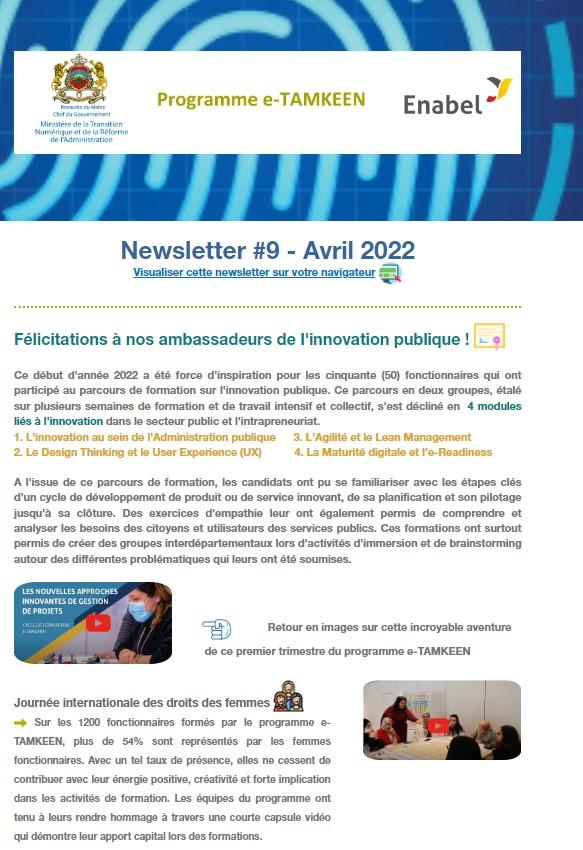
Consultez la 8ème newsletter trimestrielle de l’intervention e-TAMKEEN du Maroc
Bénédicte BAZYN | 14/06/2022
Ne manquez pas la huitième newsletter trimestrielle de l’intervention eTAMKEEN, un projet de renforcement des compétences des fonctionnaires au niveau central et local en matière de #digitalisation.Cette édition s’intéresse particulièrement au parcours certifiant de formation des fonctionnaires ainsi qu’au différentes échange internationaux qu’à connu le programme en ce premier trimestre 2022.Consultez la newsletter via ce lien : https://bit.ly/3OIbNjUInscrivez-vous à nos prochaines Newsletter via ce lien : http://eepurl.com/gYow-5
-

Maroc : Imaginer des solutions innovantes aux challenges de l’Administration, une compétence assurée avec e-TAMKEEN.
Bénédicte BAZYN | 14/06/2022
Au-delà de renforcer les compétences des fonctionnaires marocain.e.s en matière de digital, e-TAMKEEN entend leur donner les outils nécessaires pour surmonter les challenges qu’ils rencontrent au quotidien au niveau de l’Administration publique, tels que la gestion des carrières et l’aquisition de compétences, la gestion des marchés publiques ou encore la conciliation entre la vie professionnelle et personnelle. C’est dans cet esprit que tout au long du premier trimestre 2022, des formations certifiantes sur des thématiques liées à l’innovation et l’intelligence collective ont été organisées pour les niveaux centraux et locaux des différents ministères. Innover dans le secteur public, le nouvel objectif d’une soixantaine d’hommes et femmes Les mois de février et de mars ont été l’occasion de compléter les parcours certifiants sur « Les nouvelles approches innovantes de gestion de projets » entamé en fin 2021. Au cours de 12 semaines, 60 fonctionnaires (dont 62% de femmes) ont pu enrichir leurs compétences sur le Design Thinking et la User Experience, l’Agilité et le Lean Management, l’Innovation au sein de l’Administration publique ainsi que la Maturité Digitale et l’e-Readiness. A travers des ateliers pratiques et interactifs, des représentants de tous les départements bénéficiaires d’e-TAMKEEN se sont familiarisés avec les processus de création de dispositifs innovants pour le secteur public. La particularité de ce nouveau mode de penser : se centrer sur les besoins des citoyens. De l’analyse empathique de problématique au pitch d’une solution, en passant par le prototypage et le travail collaboratif, des groupes interministériels ont pu échanger et mener des dynamiques créatives autour de projets communs. Voir la vidéo Dans les régions, un grand intérêt pour surmonter les challenges de l’Administration En parallèle, e-TAMKEEN a organisé deux Master Class sur l’Intelligence Collectives et la Résolution des Problèmes Publics à destination de représentants de la Direction Générale des Collectivités Territoriales et des fonctionnaires des communes de la région de Marrakech. Plus de 70 participants ont ainsi suivi 5 jours de formations en partie à Rabat et dans les locaux de l’Université Mohamed VI Polytechnique à Ben Guerir, à l’issue desquels ils se sont vu attribuer un certificat reconnaissant leurs nouvelles aptitudes. Plus précisément, les objectifs de ces sessions d’exception étaient d’utiliser l'intelligence collective pour stimuler la performance d’équipe et favoriser l’émergence de nouvelles solutions, tout en développement une intelligence émotionnelle et en combinant différentes approches de facilitations pour un résultat rapide. La formation en ligne, une nécessité qui s’impose à tous les Ministères du Maroc Un des challenges majeurs que rencontrent aujourd’hui les services de formation de l’Administration est sans conteste la possibilité de renforcer les capacités de leurs collaborateurs à distance. Conscient de cela, e-TAMKEEN a décidé d’ouvrir ses modules d’introduction à l’e-learning à l’ensemble des départements ministériels du territoire. Cette démarche a permis de porter à 222 le nombre de fonctionnaires sensibilisé à l’utilité de recourir digital learning dans le cadre de la formation continue des employés du service public. Cette session introductive est la première étape d’un cycle d’approfondissement de connaissances en la matière, à la suite duquel les participants seront à-même d’implémenter des solutions e-learning au sein de leurs départements. Soutenir les femmes fonctionnaires dans la conception de leurs propres solutions Adresser les challenges de l’Administration publique, c’est aussi faire tomber les obstacles que rencontrent les femmes opératrices et utilisatrices des services publics. Les parcours que propose e-TAMKEEN donnent ainsi à chacun des clés pour être acteurs et actrices d’un changement équitable et durables pour tous, sans distinction de genre. A l’occasion de la journée internationale des droits de la femme, le programme a d’ailleurs mis en lumière les solutions qu’ont imaginé ses bénéficiaires, par une démarche de Design Thinking, pour permettre aux mères de famille une meilleure conciliation de leurs vies personnelles et professionnelles. Voir la vidéo.
-
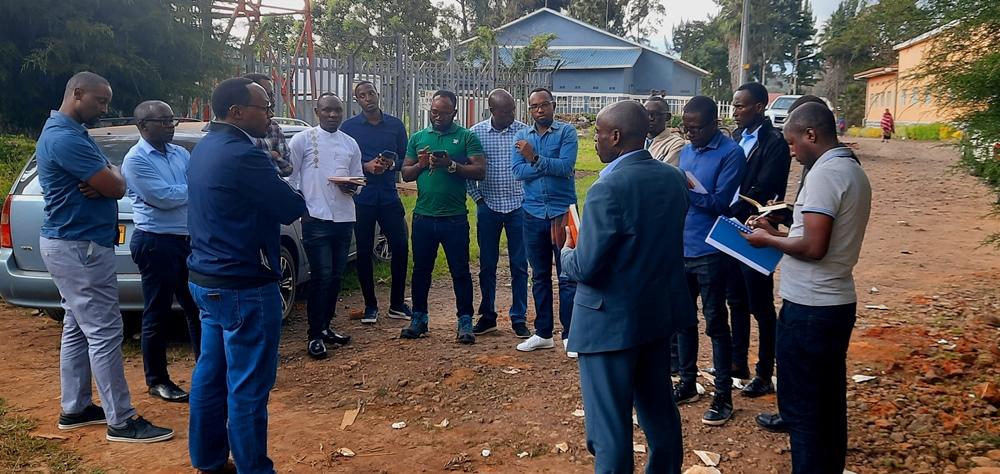
Rwanda: Musanze Youth Centre aim to empower Young Generations
Alexandre KAYITARE | 14/06/2022
Establishing a renovated youth centre in Musanze District would build a productive young generation as it will empower young people with various skills and knowledge which would guide them toward a self-reliance in diversity of professions. Musanze, one of the Secondary Cities to the capital city of Kigali, is a fast-growing city that focusses its ambitious vision on Tourism, Urbanization, Education and skills among others. In a kickoff meeting held in Musanze District on June 09th 2022, Enabel through its Urban Economic Development initiative (UEDi) together with its various stakeholders in the activity of scaling up the Musanze District youth center, launched the process of construction activities which will start by end June. In this inception meeting, UEDi presented the site to BETRA Construction as a contractor who on the other side agreed to comply with terms and conditions in the implementation process of the construction activities which are due to last nine months. The construction project, worth more than Rwf 1.5 Billion, aims at developing a promotion and talent center that will empower the community with employment opportunities in different disciplines of sports and culture. It is in long run plans of the district to make Musanze District attractive for domestic, regional and international championships and visibility. This youth empowerment center which will be set in Muhoza sector, will have Fabrication lab (known as Fab lab) which consists mainly of big machines, Knowledge lab (known as k lab) which is mostly about ICT skills, Library where people can read quietly to increase their knowledge, Employment service rooms to help people mostly the youth get access to available jobs, recreation facilities, playgrounds (mini football, volleyball pitches) among others. According to the newly approved National Youth Policy 2018-2024, Considering youth centres as an effective development facility to young generations, Enabel has so far supported eight youth centers, including seven renovated and equipped by Barame intervention in its seven supported districts, (one in Gakenke, one in Gisagara, one in Karongi, one in Nyamasheke, two in Nyarugenge – Kimisagara and Nyamirambo, one in Rulindo and one in Rusizi) as well as the renovation of this upcoming youth friendly centre planned in Musanze District.
-
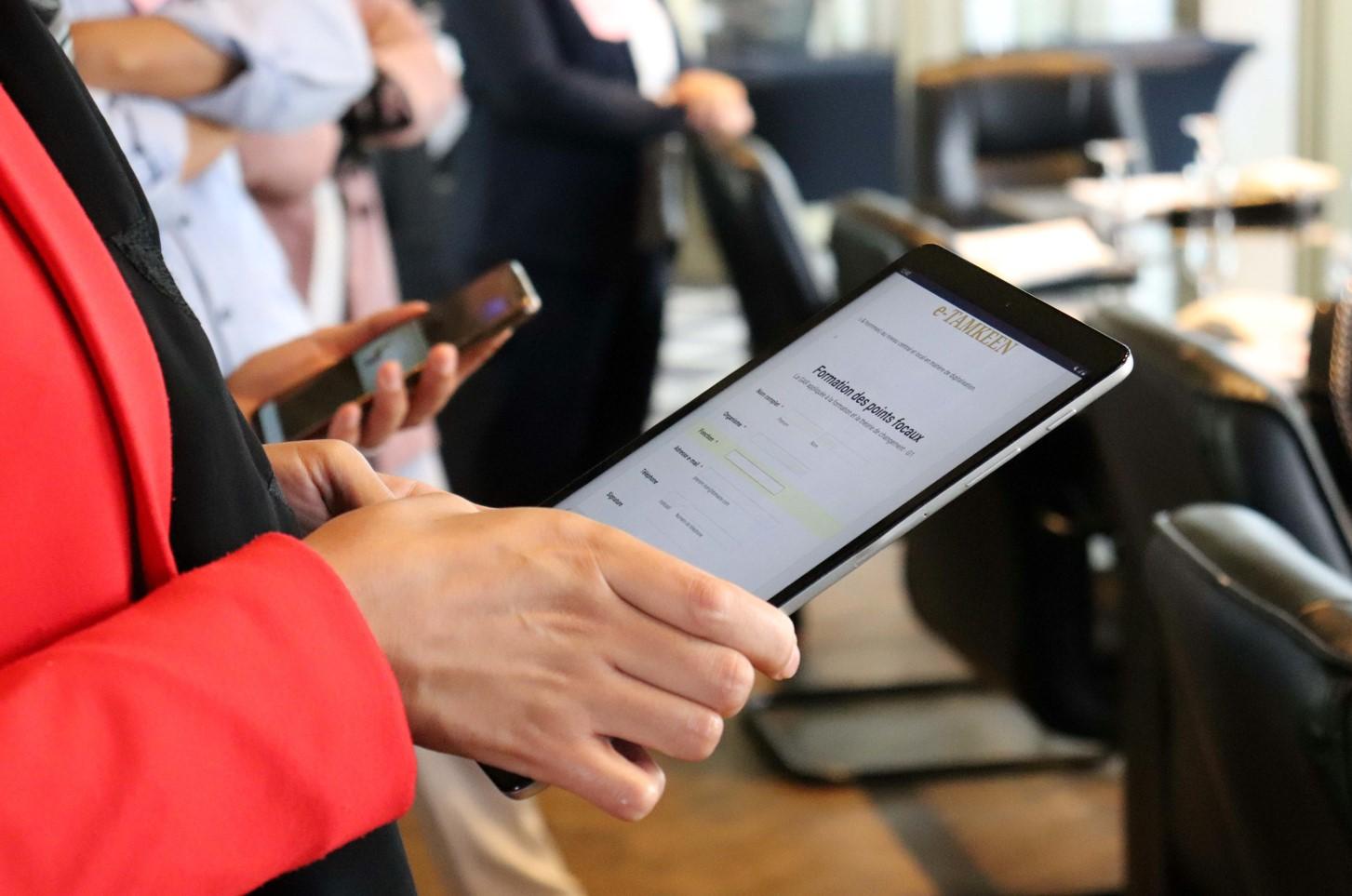
Maroc : e-TAMKEEN finalise sa démarche de capitalisation et en commence la mise en œuvre
Bénédicte BAZYN | 14/06/2022
Entre décembre 2021 et mars 2022, e-TAMKEEN a mené avec l'ensemble de ses parties prenantes un processus de co-création de sa démarche de capitalisation. Les rencontres et ateliers menés dans ce sens ont permis d'aboutir à un plan d'action concret qui sera concrétisé dans les mois à venir. Capitaliser, pour un projet, c'est apprendre des expériences vécues. C'est une démarche qui vise à garder la mémoire, formaliser et partager l'expérience, garantir la continuité des actions et améliorer les pratiques. Créer un produit sur lequel le partenaire de mise en œuvre pourra s'appuyer afin de dupliquer les bonnes pratiques du programme, est ainsi un des objectifs phares d'e-TAMKEEN. Il est question à terme, d’identifier, analyser et recueillir les changements et les expériences générés par le programme, afin de produire de la connaissance partageable et appropriable. En fin d'année 2021, l'équipe s'est donc entourée d'experts pour mener des rencontres avec l'unité de gestion et des focus groups avec les points focaux du projet afin de baliser les thématiques sur lesquelles un retour d'expérience tangible est nécessaire. Les retours des parties prenantes ont permis d'organiser, le 8 mars, une journée de sensibilisation et de brainstorming pour imaginer plus concrètement les produits de capitalisation du programme. La prochaine étape consiste désormais en la mise en œuvre des outils proposés, des éléments qui se voudront à la fois digitaux et innovant, à l'image d'e-TAMKEEN.
-
In Uganda, Enabel organises a blood donation drive to save lives
William YEKA | 14/06/2022
Several lives are expected to be saved by blood donated by Enabel staff recently. The blood donation drive organised in partnership with Uganda Blood Transfusion Service took place at Nakasero National Blood Bank in Kampala. Uganda Blood Transfusion Service is the body responsible for blood transfusion and safety activities countrywide.The exercise aimed at increasing the supply of emergency blood following repeated cries for blood by regional blood banks and health facilities. Enabel Health Programme Manager Dr. Monica Imi said blood shortage is a serious health problem requiring urgent and collective effort. World Health Organization’s global database on blood safety calls upon countries to collect blood equivalent to at least 1 percent of their population. Uganda last year collected 260,000 units of blood compared to a target of 340,000 units. Dr. Imi said blood shortage is resulting in several avoidable deaths caused by conditions related to the shortage of blood including heavy bleeding in women after childbirth. According to Uganda Red Cross Society, schools have been the number one blood collection point, supplying 70 percent of the blood. Unfortunately, the 2-year closure of learning institutions due to COVID-19 cut off access to students hence worsening the blood shortage crisis. Uganda has seven regional blood banks (Arua, Fort Portal, Gulu, Kitovu, Mbale, Mbarara, and Nakasero) charged with the responsibility of supplying blood to health facilities in their respective jurisdictions. There are also six blood collection centers located in Hoima, Jinja, Kabale, Rukungiri Lira and Soroti. The collection of safe blood adequate to meet the transfusion needs of all patients in the country is one of the priorities of the latest Uganda Blood Transfusion strategic plan. World Blood Donor Day Uganda today joins the rest of the world to commemorate Blood Donor Day 2022 held under the theme; “Donating blood is an act of solidarity. Join the effort and save lives.” The theme focuses on the need to increase the number of blood donors. Uganda is estimated to have between 80,000 - 90,000 registered blood donors.
-

Le projet PAISS 5 vise à l’amélioration de la qualité des soins au Burundi
Jonas Eric UWIZERA | 14/06/2022
Le Programme d’appui institutionnel au secteur de la santé mis en œuvre par Enabel au travers de son volet 5 est dédié aux infrastructures et à l’équipement des formations sanitaires dans les Provinces de Kirundo, Muramvya, Rumonge et Bujumbura rural.Mis en œuvre depuis 2015, avec un budget de plus de 20 millions d’euros dédié spécifiquement à la construction et à l’équipement d’hôpitaux, de centres de santé et de bureaux de districts sanitaires. Le PAISS assure aussi la sécurisation énergétique et l’approvisionnement en eau des Centres de santé de ses zones d’intervention. L’intervention développe également une stratégie de maintenance décentralisée qui contribue à la durabilité des investissements. Le PAISS 5 au travers de son action et en synergie avec les autres interventions Enabel, donne les moyens aux districts sanitaires d’améliorer la qualité de l’offre de soins de santé au niveau de leurs formations sanitaires en travaillant à la fois sur l’amélioration des conditions de travail des Equipes Cadres de District et en améliorant la performance du plateau technique des Formations Sanitaires. plus de détails dans cette vidéo.
-
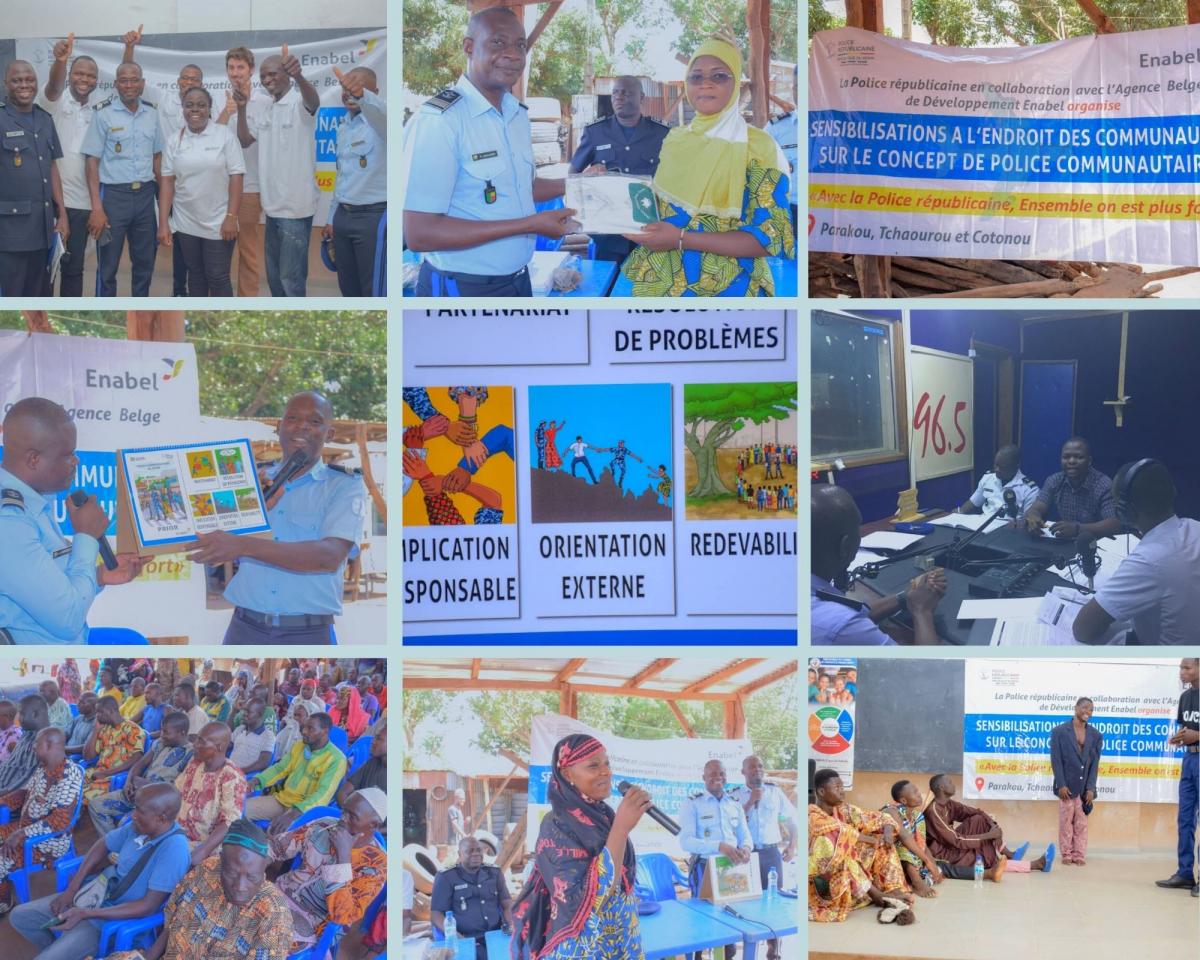
Bénin: Enabel et la Police républicaine en campagne de sensibilisation pour mieux informer les communautés
Reece-hermine ADANWENON | 13/06/2022
C’est pour mieux la faire connaître et susciter l’adhésion des communautés à sa mise en œuvre que la Police républicaine et Enabel ont initié une campagne conjointe de sensibilisation.La ville de Parakou située au Nord du Bénin a accueilli du 30 mai au 03 juin 2022, la première phase de la campagne de sensibilisation des communautés sur le concept de police communautaire.Plusieurs activités ont meublé cette campagne notamment : - 03 séances de sensibilisation grand-public avec les étudiants de trois facultés ; - 02 séances d’information sur deux gares routières que compte la ville de Parakou ; - 04 émissions radiophoniques en français et en langues locales (Dendi et Bariba).Les populations très intéressées par l’approche, souhaitent qu’elle soit mise en œuvre sur toute l’étendue du territoire national.
-

VIDEO - Burundi: L’intermédiation sociale ou une une approche pour une gestion durable des ouvrages hydrauliques
Jonas Eric UWIZERA | 13/06/2022
Le Programme d’appui institutionnel au secteur de la santé mis en œuvre par Enabel, l’agence belge de développement, au travers de son volet 5 est dédiée aux infrastructures et à l’équipement des formations sanitaires dans 5 provinces d’interventions. Dans le cadre des activités de l’intervention, des travaux ont été réalisés pour permettre à plus de 300.000 personnes de bénéficier de l’approvisionnement en eau potable de 25 Centres De Santé à Kirundo, Muramvya, Bujumbura Rural et Rumonge. L’ONG Pro Action Développement, a été mobilisé par Enabel pour assurer l’accompagnement des travaux au travers de la sensibilisation des communautés en vue de leur adhésion, de leur pleine participation à la mise en œuvre des activités du projet, notamment, la mobilisation des contributions financières des bénéficiaires, le suivi de l’entretien des réseaux et l'élaboration des règles de gestion. Ces activités permettent d’assurer une plus grande durabilité des ouvrages.Les détails dans cette vidéo.
-
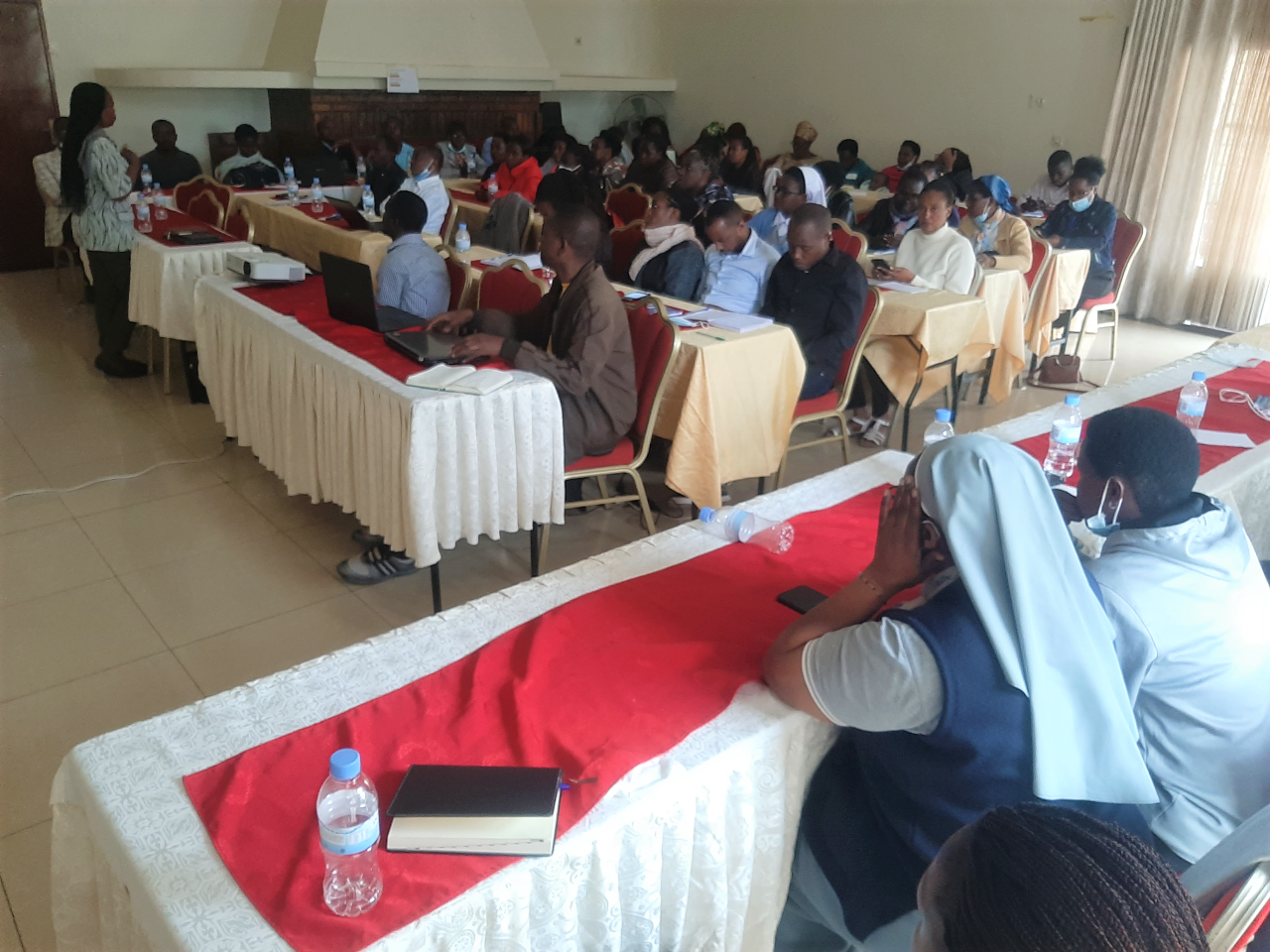
Rwanda: Strategizing to reduce dropouts from Antenatal Care and fmily planning programs in Rulindo District
Denise NSANGA | 10/06/2022
According to Rwanda Demographic Health Survey (DHS) 2019-2020, only 47% of Rwandans who gave birth in the 5 years preceding the survey had four or more Antenatal Care (ANC) visits and, overall, 64% of currently married women use a family planning method, with 58% using a modern method and 6% using a traditional method. On the other hand, reports from Health Management Information System (HMIS) 2020-2021, indicate that 59% of pregnant women attended Antenatal Care visit in the first trimester and 45% of pregnant women conducted at least 4 Antenatal Care visits during their pregnancy. Despite the efforts and achievements made through the Rwanda’s Ministry of Health and its partners to improve the above key indicators, some dropout cases from Antenatal care and family planning programs continue to be registered. In this context, from 06-09 June 2022, Rulindo district, one of the seven districts of the Belgium-funded health intervention, in partnership with Enabel, organized a four-day workshop of key actors in Family Planning and Antenatal Care service delivery to share their best practices, identify and discuss on challenges and possible strategies to improve on quality of services related to FP uptake and ANC visits. Participants in this session include district and hospital representatives, heads of health centres, representatives of health posts as well as secondary health posts’ providers all from Rulindo district in the Northern Province of Rwanda. As a result of the workshop, each hospital catchment zone has elaborated improvement plan to improve quality of services and address most of factors leading to increased dropout from ANC and FP programs.Rulindo district aims to increase to four ANC standard visits from 59% (2020-21) to 60% in 2024, and FP uptake from 63% (2020-21) to 65% in 2024 and increase post-partum family planning (PPFP) from current 66% (2020-21) to 76% in 2024.
-
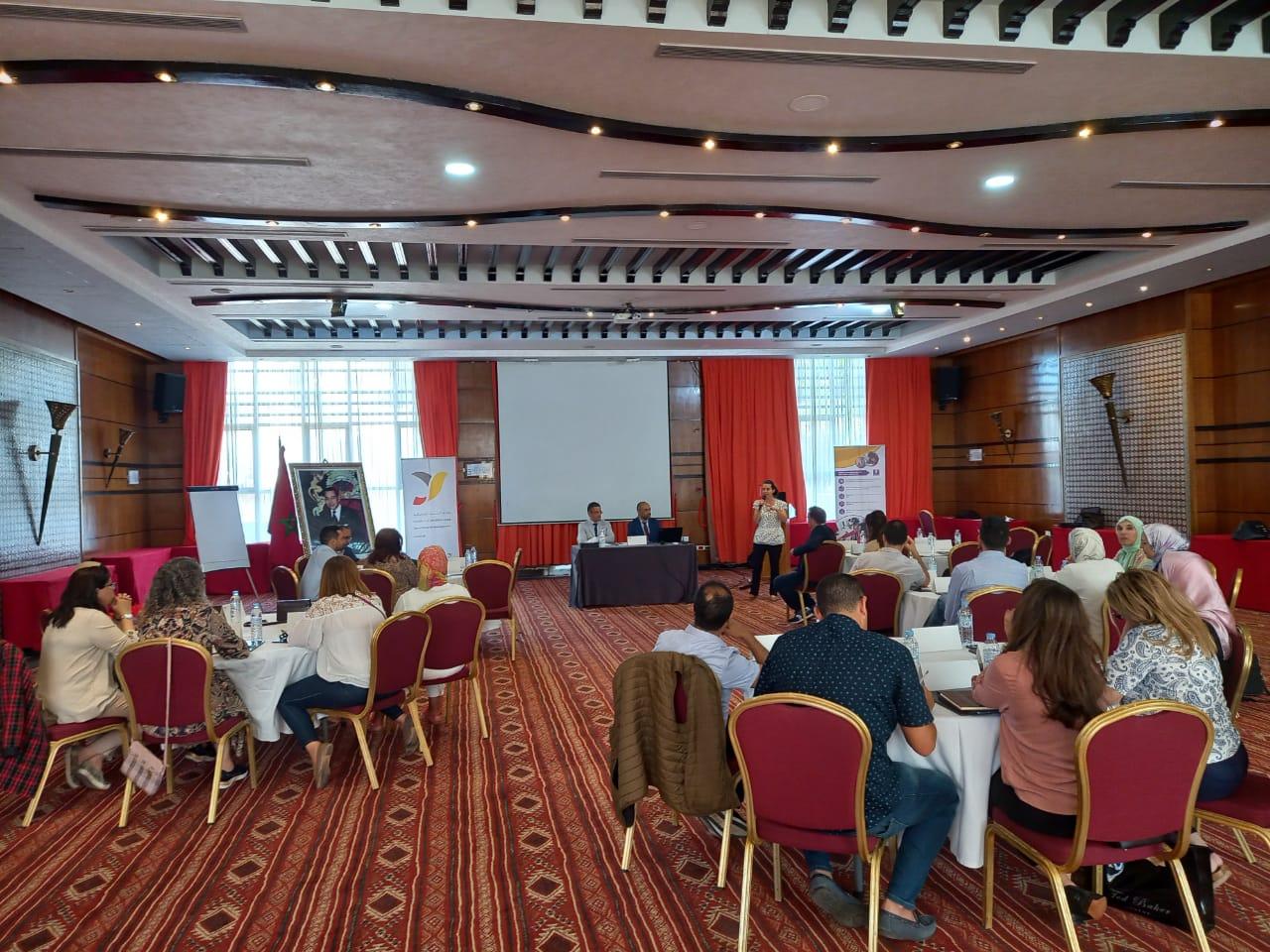
Maroc: Partage d'expérience entre les services publics de l’emploi marocain et wallon sur l’insertion professionnelle des personnes migrantes
Clara HUYGHE | 10/06/2022
Accompagnement des ressortissants des pays tiers, accès aux mêmes services que les nationaux et amélioration de l’accès à l’emploi, ce sont là quelques similitudes entre les services publics de l’emploi au Maroc et en Belgique. Dans le cadre du projet « Amuddu : appui à la mise en œuvre de la Stratégie Nationale d’Immigration et d’Asile (SNIA) », du 30 mai au 3 juin, des sessions de formation et d’échange ont été organisées à Casablanca entre l’Agence nationale de promotion de l’emploi et des compétences (ANAPEC), service public de l’emploi marocain, et l’Office wallon de la formation professionnelle et de l’emploi (Le Forem). L’objectif principal était de partager des expériences du Maroc et de la Belgique en matière d’accompagnement à l’insertion professionnelle des personnes migrantes, notamment à travers la présentation des méthodes et des outils d’accueil et d’accompagnement vers l’emploi. Des cadres de l’ANAPEC et des experts du Forem ont eu l’occasion de discuter ensemble afin d’approfondir leurs compétences techniques et de réfléchir sur des pistes d’amélioration des pratiques sur ce domaine. Lors de ces rencontres, une contextualisation de l’accueil des personnes migrantes en Belgique et au Maroc a été faite. Par la suite, le Forem a détaillé le parcours de l’accompagnement des migrant.es en informant les participants sur les approches et les outils utilisés à chaque étape, tels que l’inscription, l’entretien de bilan, les tests de (pré)-positionnement et compétences clés, le positionnement métier et l’essai-métier. Convaincue de l’impact positif de tels échanges permettant à des fonctionnaires publics homologues marocains et belges de partager leurs défis et leurs bonnes pratiques sur des aspects concrets de leur travail, Enabel a toujours recherché la mise en place de synergies avec des acteurs belges. C’est ainsi que dans le cadre du projet Amuddu, une collaboration avec le service public d’emploi en Wallonie (Le Forem) a commencé en 2019. Plusieurs actions concrètes de partage sur leurs services et pratiques, ainsi que sur des approches innovantes comme le mentorat, en faveur des personnes migrantes ou primo-arrivants ont suivi en 2021. Cela a, par ailleurs, permis d’asseoir un cadre partenarial avec le service public de l’emploi marocain (ANAPEC).
-
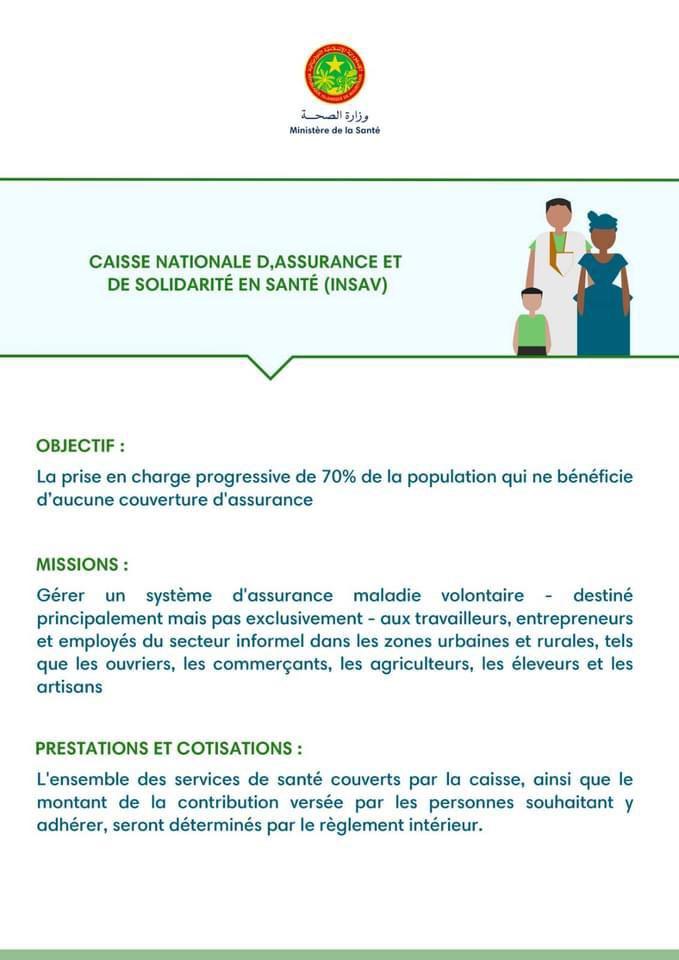
Mauritanie: Adoption du décret permettant la création de la Caisse nationale de solidarité santé
Aminata KANE | 10/06/2022
Enabel en Mauritanie a accompli dans le secteur de la santé un renforcement qui aura un impact essentiel pour la couverture de la santé en Mauritanie. Cette couverture santé bénéficie du soutien financier de l’Union européenne au travers du PASS (Programme d’Appui au Secteur de la santé) mis en œuvre par Enabel en Mauritanie.Ce 8 juin 2022, l'adoption au Conseil des Ministres du Décret permettant la création de la CNASS (INSAV)- Mise en place d’une Caisse nationale de solidarité santé (CNASS) sous la forme d’une assurance maladie contributive volontaire pour l’amélioration de l’offre sociale et le soutien à la demande devant permettre d’atteindre la couverture sanitaire universelle pour toute la population mauritanienne.Au travers d’un appui budgétaire, l’Union européenne couvrira également dans la première phase (2022-2025) les charges liées au fonctionnement et aux équipements de l’établissement ainsi que la subvention à la cotisation des adhérents. Un résultat qui contributie à l'accès à l'offre des soins pour les populations mauritaniennes.
